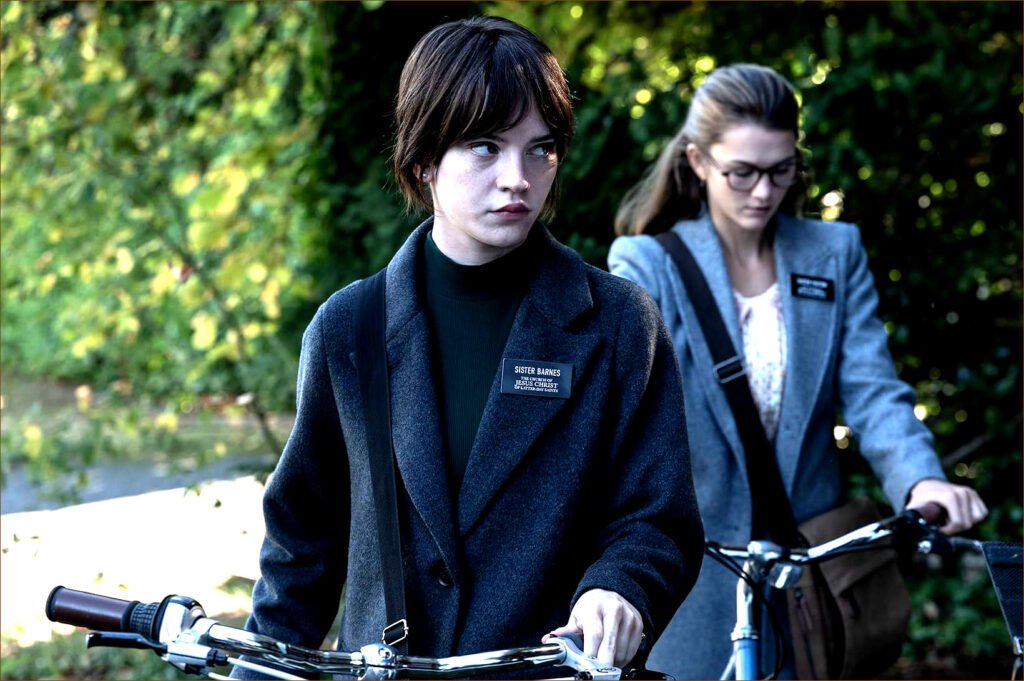In the labyrinthine corridors of human belief and fear, “Heretic” emerges as a taut, cerebral thriller, where every frame pulsates with tension and the potency of its actors’ performances. Directed by the talented duo Bryan Woods and Scott Beck, this gripping tale, which graced theaters recently, follows two earnest Mormon missionaries—Sister Barnes, portrayed by the resolute Sophie Thatcher, and Sister Paxton, brought to life by the vibrant Chloe East—as they venture into the isolated confines of a home that holds secrets darker than they could have anticipated.
The enigmatic Mr. Reed, played with chilling finesse by none other than Hugh Grant, becomes their unwitting captor, luring them into a web of psychological manipulation and philosophical wrestling, promising them insight into “the one true religion.” With a deliberate pacing that mirrors the dread weaving through the air, “Heretic” tantalizes with its reflective performances; however, it ultimately falls short of delivering a transcendent revelation that its premise teases.
While visually arresting and sometimes punctuated by grizzly imagery, this narrative leans heavily into emotional coldness rather than sensory overload. Reed is not a wild-eyed killer prowling in the shadows; rather, he is a sinister figure standing resolute, shrouded in a twisted determination to dissect the sisters’ faith through probing dialogues—each exchange bubbling with a haunting undercurrent. He preys on their resolve with unsettling grace, always assuring them they can leave whenever they wish, even as they find their freedom eclipsed by the claustrophobic confines of his home filled with unspeakable curios.
Conversations within these walls are far from idle chatter; they pulse with theological inquiry, subjecting the young women to a storm of existential doubt. Reed’s inquiries feel theatrically invasive, forcing the sisters—and the audience—to confront uncomfortable truths about their beliefs. From disquieting discussions about polygamous traditions to shadowy hints about mortality and morality, these exchanges reveal a sinister depth to Reed’s intentions, ensuring viewers are kept on the metaphorical edge of their seats.
The heart of the film beats strongest in Reed’s relentless assault on the sisters’ convictions, as he morphs between a mundane spouse, an impassioned scholar, and a calculated manipulator, with Grant exuding an unsettling charisma that commands attention. Through lengthy, elaborate monologues, he dances on the razor’s edge between intellect and insanity, twisting language into labyrinths of seduction that both enthrall and repel. His presence looms like a malevolent specter, absorbing every ounce of emotional resonance and tension from his on-screen companions.
As for Thatcher and East, they rise splendidly to the occasion, evolving from docile seekers of truth to fierce warriors of their own beliefs, embroiled in a battle of wits against the apocalyptic backdrop of Reed’s ideological machinations. Their performances glimmer, capturing the gradual shift from naivety to a resolute determination, their nuanced portrayals rendering the dichotomy of faith and fear all the more palpable.
Yet, for all its thematic ambition, the film falters in its structural presentation. Reed’s dialogues, while crafted to provoke, occasionally come off as the ramblings of a pretentious commentator rather than a profound philosopher, almost resembling a subpar YouTube essay on religion. Such moments undermine the central message—it becomes clear his convoluted arguments are less about enlightenment and more about obfuscation.
Moreover, as the storyline unfurls, the foundation of plausibility begins to tremble; the meticulously constructed world starts to fall prey to contrivances that render its more chilling elements somewhat far-fetched. What initially feels like a grounded narrative unfurls into an absurdity that strains belief—culminating in a climax that, while disturbing, also risks losing the audience’s emotional investment.
Yet, how heartbreaking it is! With its exquisite cinematography, an evocative score, and striking set designs, “Heretic” creates an environment ripe for horror—every whispered confession and frantic chase through shadowy hallways elevates the storytelling. East’s character exploration is particularly captivating, peaking during one of the film’s pivotal twists, and Mr. Reed’s complex portrayal turns Grant into a masterclass of villainy.
Despite its flaws, the film remains an engaging viewing experience, orchestrating a tense rhythm that belies its runtime. “Heretic” may stumble in its ultimate message, yet the gripping exploration of faith cast against the backdrop of terror ignites a flame of intrigue—one that makes this disquieting tale a sermon still worthy of your attention.

